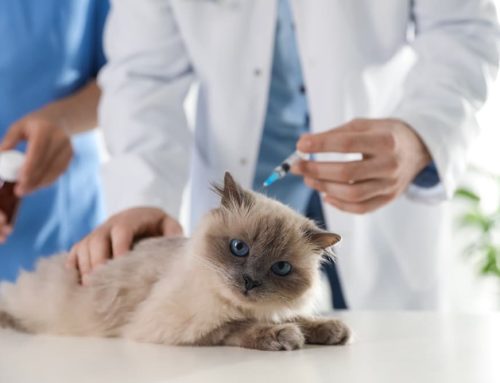Is My Senior Pet in Pain? A Complete Guide to Recognizing and Relieving Chronic Discomfort
Years of chasing tennis balls can wear down a dog’s joints, and a lifetime of mischievous leaps on and off the kitchen counter can take a toll on a cat’s body. What once looked like boundless energy may later show up as stiffness, slower walks, or skipped jumps onto the couch. While these changes are often dismissed as “just aging,” for many pets they point to chronic pain.
Because animals instinctively mask discomfort, families may not notice the signs until quality of life begins to slip away. At Sonoran Sky Pet Hospital in Mesa, we help pet parents recognize those subtle clues early and provide advanced, compassionate care to restore comfort and mobility.
Why Older Pets Hide Pain
In nature, showing weakness makes animals vulnerable, and that survival instinct remains strong in our pets. Instead of crying out, they adapt- moving less, sleeping more, or changing habits in subtle ways. What may seem like normal aging is often treatable pain.
Many dogs with arthritis will simply refuse longer walks, while cats with dental pain may eat only on one side of the mouth or groom less frequently. By the time these signs are visible, the pain may have been present for months. Learning to recognize the language of discomfort empowers you to act before small problems become crises.
Signs of Pain in Senior Dogs
Common pet pain signs include:
- Reluctance to climb stairs or jump into the car
- Stiffness after resting
- Panting while at rest
- Changes in posture or gait
- Irritability when touched
The AAHA Mobility Matters guide provides an in depth guide to pet pain and how it affects mobility- like head bobbing, limb favoring, or decreased playfulness.
Signs of Pain in Senior Cats
Cats are even better at hiding discomfort. Instead of limping, you may see:
- Jumping onto lower surfaces than before
- An unkempt coat due to reduced grooming
- Hiding or withdrawing from family interactions
- Avoiding the litter box because squatting or climbing in hurts
- Changes in sleeping location- cats that abandon their usual sunny perch or bed may be avoiding a jump that now causes pain
Because these signs are easy to miss, veterinarians may also use tools such as the Feline Grimace Scale (which evaluates changes in a cat’s facial expression) to more accurately detect and measure pain. Together, your careful observations at home and our diagnostic tools in the clinic help uncover discomfort before it robs pets of their quality of life.
Common Causes of Chronic Pain
Common painful conditions include arthritis, dental disease, cancer, soft-tissue injury, and neuropathic pain.
Dental disease deserves special mention. Periodontal infections, fractured teeth, and feline tooth resorption can cause severe, ongoing discomfort yet remain invisible without dental X-rays. Pets rarely stop eating entirely, so subtle signs like chewing more slowly or dropping kibble should not be ignored.
Our Comprehensive Pain Assessment
Accurate diagnosis is the foundation of relief. At Sonoran Sky, your pet’s workup may include:
- Orthopedic and neurologic exams to localize pain.
- Digital radiographs to assess joints, fractures, or tumors.
- Ultrasound imaging to evaluate muscles, tendons, or internal disease.
- In-house diagnostics including blood panels, urinalysis, and parasite screens.
- Dental assessments to identify hidden oral pain.
We may also recommend advanced testing like CT imaging through our partner services when standard tools don’t provide enough detail. These layers of information ensure your pet receives the safest, most effective care.
Creating an Effective Treatment Plan
Pharmaceutical Relief
Veterinary medicine today offers a wide spectrum of options. Drugs used to relieve pain include NSAIDs, opioids, and adjunctive medications like gabapentin. For osteoarthritis, newer monoclonal antibody therapies such as Librela for dogs and Solensia for cats provide monthly injections that safely block nerve growth factor and reduce pain without straining the kidneys or liver.
Rehabilitation and Alternative Therapies
- Laser therapy accelerates cellular repair and reduces inflammation. Learn more about cold laser therapy and our in-clinic laser services.
- Acupuncture stimulates nerves and releases endorphins, easing pain in arthritic or neurologic pets.
- Massage and stretching, as outlined in AAHA’s massage guide, loosen tight muscles and restore mobility.
Lifestyle Adjustments
Managing chronic pain isn’t just about what happens at the clinic- it’s also about supporting your pet daily at home. Thoughtful changes to the environment and routine can significantly extend the benefits of medications, laser therapy, or acupuncture.
For dogs, assistive devices for arthritic pets like supportive harnesses, slings, or wheeled carts help them remain mobile with less strain. Adding rugs on slippery floors, using baby gates to block off stairs, or providing arthritis-friendly home adjustments such as raised food and water bowls can make daily activities more comfortable. Even small tweaks- like shorter, more frequent walks instead of one long outing- help prevent soreness while keeping muscles engaged.
Cats benefit from different strategies. Placing water bowls near favorite sleeping spots, litter boxes on every floor of the home, offering ramps or low platforms to reach favorite perches, and providing heated bedding can reduce stress on joints and make everyday needs easier. Senior cats may also appreciate covered resting spaces in quiet areas, where they can nap without the effort of climbing or jumping.
Both dogs and cats benefit when owners focus on gentle, positive interactions- brushing, massage, or calm play sessions that stimulate without exhausting. These adjustments ensure that the medical progress achieved at the hospital continues to translate into a better daily life at home.
Wellness Plans for Ongoing Comfort
Prevention and early detection are the cornerstones of long-term health. Our preventive and wellness care and tailored wellness plans make routine visits accessible for every life stage:
- Juvenile Plans for puppies and kittens under 6 months provide unlimited exams, vaccines, parasite screens, and priority scheduling. There are many issues that start from a young age that can cause severe pain later in life, like hip dysplasia, underbites, entropion, and retained baby teeth. Great wellness care at a young age can prevent many chronic painful conditions when your pet reaches senior status.
- Adult Plans include unlimited office visits, vaccines, blood work, and parasite testing.
- Dental Plans offer professional cleanings with radiographs to address painful oral disease before it becomes severe.
Wellness plans not only make budgeting easier, they also ensure your pet receives consistent preventive care that can uncover pain before it escalates.
When Pain Becomes an Emergency
Chronic discomfort can escalate into crisis. Contact our urgent care team immediately if your pet shows:
- Sudden collapse or inability to walk
- Continuous crying or aggression when touched
- Severe abdominal or limb swelling
- Rapid breathing or restlessness
- Straining without being able to urinate
Our urgent-care doctors are available during open hours, and after-hours emergencies are referred to trusted ER hospitals to ensure continuous support.

Your Mesa Partner in Senior Pet Comfort
At Sonoran Sky Pet Hospital, we believe senior pets deserve more than “good enough”- they deserve to thrive. With advanced diagnostics, multimodal pain relief, holistic therapies, and supportive wellness plans, we provide care as unique as your pet.
If you’ve noticed changes in mobility, appetite, or mood, call us at 480-808-3255. Relief starts with a conversation, and our team is ready to restore your pet’s comfort and quality of life.








Leave A Comment